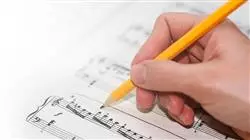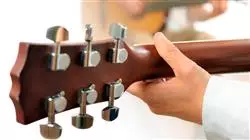University certificate
The world's largest faculty of humanities”
Introduction to the Program
Walk through the principles of Musical Education at School with TECH”

Music is a discipline that is constantly evolving and changing, and in which teachers must always be updated and trained to be able to effectively transmit their knowledge to their students. In this sense, Musical Education is presented as a fundamental area for the preparation of professionals in Music and for the continuous improvement of the quality of Music Education.
Thus, the Postgraduate certificate in Musical Education is postulated as an academic opportunity that focuses on the development of the didactic skills necessary to provide quality music education. Throughout the program, students will have the opportunity to acquire specific skills in Musical Education, such as improvisation and musical composition, which will allow them to develop their creativity and apply it in the classroom. Aspects related to the teaching of music at different educational stages will also be addressed.
In addition, the Postgraduate certificate in Musical Education is taught 100% online, allowing students to adapt their study schedule to their personal and professional needs. Likewise, the program uses Relearning as a methodological substrate. Through dynamic materials such as videos, interactive diagrams or case studies, students will internalize all the concepts more quickly.
Get up to date in the psychological foundations of Musical Education to ensure the successful performance of students”
This Postgraduate certificate in Musical Education contains the most complete and up-to-date educational program on the market. The most important features include:
- The development of case studies presented by experts in Musical Education
- The graphic, schematic, and practical contents with which they are created, provide practical information on the disciplines that are essential for professional practice
- Practical exercises where the self-assessment process can be carried out to improve learning
- Its special emphasis on innovative methodologies
- Theoretical lessons, questions to the expert, debate forums on controversial topics, and individual reflection assignments
- Content that is accessible from any fixed or portable device with an Internet connection
You will be an expert in distinguishing the different types of Melody, choosing the most appropriate songs for the infant, Primary or Secondary stage”
The program’s teaching staff includes professionals from sector who contribute their work experience to this educational program, as well as renowned specialists from leading societies and prestigious universities.
Its multimedia content, developed with the latest educational technology, will provide the professionals with situated and contextual learning, i.e., a simulated environment that will provide an immersive education programmed to learn in real situations.
The design of this program focuses on Problem-Based Learning, by means of which the professionals must try to solve the different professional practice situations that are presented throughout the academic course. For this purpose, the students will be assisted by an innovative interactive video system created by renowned experts.
Delve into dynamic Rhythm and Dance activities that you will then apply in the classroom”

Undergo case studies that will test your skills in Voice and Song Didactics”
Why study at TECH?
TECH is the world’s largest online university. With an impressive catalog of more than 14,000 university programs available in 11 languages, it is positioned as a leader in employability, with a 99% job placement rate. In addition, it relies on an enormous faculty of more than 6,000 professors of the highest international renown.

Study at the world's largest online university and guarantee your professional success. The future starts at TECH”
The world’s best online university according to FORBES
The prestigious Forbes magazine, specialized in business and finance, has highlighted TECH as “the world's best online university” This is what they have recently stated in an article in their digital edition in which they echo the success story of this institution, “thanks to the academic offer it provides, the selection of its teaching staff, and an innovative learning method aimed at educating the professionals of the future”
A revolutionary study method, a cutting-edge faculty and a practical focus: the key to TECH's success.
The most complete study plans on the university scene
TECH offers the most complete study plans on the university scene, with syllabuses that cover fundamental concepts and, at the same time, the main scientific advances in their specific scientific areas. In addition, these programs are continuously being updated to guarantee students the academic vanguard and the most in-demand professional skills. In this way, the university's qualifications provide its graduates with a significant advantage to propel their careers to success.
TECH offers the most comprehensive and intensive study plans on the current university scene.
A world-class teaching staff
TECH's teaching staff is made up of more than 6,000 professors with the highest international recognition. Professors, researchers and top executives of multinational companies, including Isaiah Covington, performance coach of the Boston Celtics; Magda Romanska, principal investigator at Harvard MetaLAB; Ignacio Wistumba, chairman of the department of translational molecular pathology at MD Anderson Cancer Center; and D.W. Pine, creative director of TIME magazine, among others.
Internationally renowned experts, specialized in different branches of Health, Technology, Communication and Business, form part of the TECH faculty.
A unique learning method
TECH is the first university to use Relearning in all its programs. It is the best online learning methodology, accredited with international teaching quality certifications, provided by prestigious educational agencies. In addition, this disruptive educational model is complemented with the “Case Method”, thereby setting up a unique online teaching strategy. Innovative teaching resources are also implemented, including detailed videos, infographics and interactive summaries.
TECH combines Relearning and the Case Method in all its university programs to guarantee excellent theoretical and practical learning, studying whenever and wherever you want.
The world's largest online university
TECH is the world’s largest online university. We are the largest educational institution, with the best and widest online educational catalog, one hundred percent online and covering the vast majority of areas of knowledge. We offer a large selection of our own degrees and accredited online undergraduate and postgraduate degrees. In total, more than 14,000 university degrees, in eleven different languages, make us the largest educational largest in the world.
TECH has the world's most extensive catalog of academic and official programs, available in more than 11 languages.
Google Premier Partner
The American technology giant has awarded TECH the Google Google Premier Partner badge. This award, which is only available to 3% of the world's companies, highlights the efficient, flexible and tailored experience that this university provides to students. The recognition as a Google Premier Partner not only accredits the maximum rigor, performance and investment in TECH's digital infrastructures, but also places this university as one of the world's leading technology companies.
Google has positioned TECH in the top 3% of the world's most important technology companies by awarding it its Google Premier Partner badge.
The official online university of the NBA
TECH is the official online university of the NBA. Thanks to our agreement with the biggest league in basketball, we offer our students exclusive university programs, as well as a wide variety of educational resources focused on the business of the league and other areas of the sports industry. Each program is made up of a uniquely designed syllabus and features exceptional guest hosts: professionals with a distinguished sports background who will offer their expertise on the most relevant topics.
TECH has been selected by the NBA, the world's top basketball league, as its official online university.
The top-rated university by its students
Students have positioned TECH as the world's top-rated university on the main review websites, with a highest rating of 4.9 out of 5, obtained from more than 1,000 reviews. These results consolidate TECH as the benchmark university institution at an international level, reflecting the excellence and positive impact of its educational model.” reflecting the excellence and positive impact of its educational model.”
TECH is the world’s top-rated university by its students.
Leaders in employability
TECH has managed to become the leading university in employability. 99% of its students obtain jobs in the academic field they have studied, within one year of completing any of the university's programs. A similar number achieve immediate career enhancement. All this thanks to a study methodology that bases its effectiveness on the acquisition of practical skills, which are absolutely necessary for professional development.
99% of TECH graduates find a job within a year of completing their studies.
Postgraduate Certificate in Musical Education
Music is a fundamental tool in the teaching-learning process of students, since it allows them to develop cognitive, emotional and social skills. At TECH Global University we have designed a Postgraduate Certificate focused on music didactics, which will allow teachers to acquire knowledge and skills to integrate music in their daily educational practice. This course will address topics such as the importance of music in education, the pedagogical principles of music teaching, and the different methodologies and resources for its implementation in the classroom.
The Postgraduate Certificate in Musical Education is a unique opportunity for educators who wish to improve the quality of teaching and achieve greater effectiveness in the learning process of their students. With this course, they will be able to acquire pedagogical skills and strategies that will allow them to design personalized teaching plans, adapted to the needs of each student and that contribute to the development of musical or cognitive skills in them.







